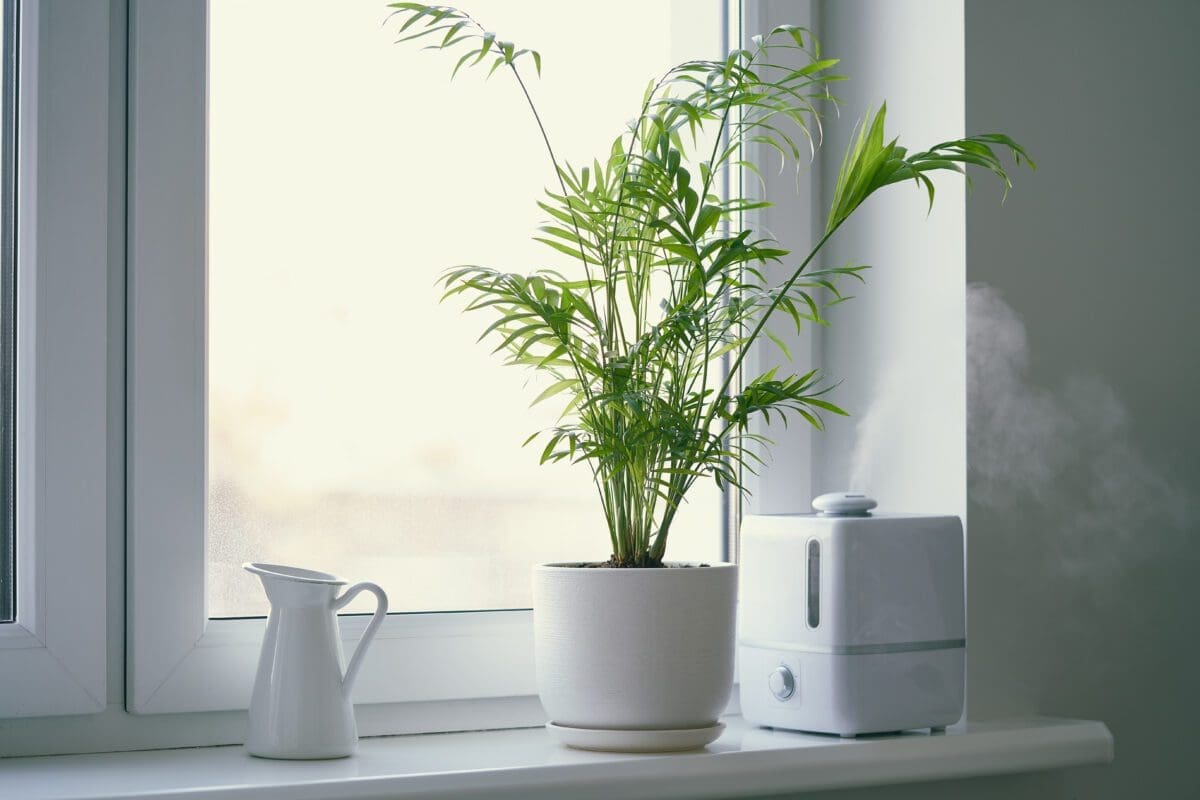Ever noticed that your throat feels scratchy or your skin a bit too dry when you wake up? Ever wondered why you cough more at night or wake up with a stuffy nose? Could it be because you are sleeping in a dry room?
If you’ve been asking yourself these questions, then you’re in the right place! Let’s talk about the effects of Sleeping in a Dry Room, shall we? You might think it’s no biggie, but guess what, it can impact more than just your sleep quality. It can have a huge influence your overall health, and well-being! But how does this happen? What’s the science behind it?
In this article, we’re going to dive into the effects of sleeping in a dry room. From the potential threat of infections and skin problems, to nasal and respiratory issues, temperature and humidity levels, they all play a role in the quality of your sleep, when you are sleeping in a dry room.
But not to worry, it’s not all doom and gloom – here’s what you need to know:

First things first, is it really bad to sleep in a dry room? Well, the short answer is, it can be. Dry air can affect your body in various ways, especially during your sleep when your body is in its rest and repair mode.
Here are some problems you might face
Dehydration: Dry air can make your throat and mouth feel parched. If you’ve ever woken up feeling unusually thirsty, dry air could be the culprit.
Skin Issues: Dry air saps moisture from your skin, leading to dryness and potential skin irritation. If you’re struggling with dry skin, your room’s dry air might be contributing to the problem.
Respiratory Problems: Dry air can dry out your respiratory tract, causing discomfort and potentially exacerbating existing respiratory issues.
Poor Sleep Quality: All of these issues can make you uncomfortable, making it hard to fall asleep or stay asleep, impacting your overall sleep quality.
Sometimes, despite your best efforts, you might find yourself needing to sleep in a dry room. This could be due to various reasons, like the climate you live in or the season. But don’t worry, it’s not all bad news! There are ways you can manage to sleep comfortably in a dry room.

The first step to fighting dryness is hydration, but from the inside out. Drinking a lot of water during the day helps keep your body hydrated. But don’t stop there, keep a glass of water on your bedside table. When you wake up thirsty in the middle of the night, you won’t have to make a trip to the kitchen.
Hydrating your body can help counteract the effects of dry air on your body.
If the air in your room is dry, it can lead to dry skin. So, another crucial step is moisturizing your skin before going to bed. Apply a good moisturizer, perhaps something with long-lasting hydration like a night cream or body lotion. Moisturizing will help prevent your skin from drying out due to the dry air in your room.
As we discussed earlier, a humidifier can be your best friend in a dry room. It can help increase the humidity level in your room, making it more comfortable to sleep. If you frequently experience dry air in your room, getting a humidifier might be a worthy investment!
This might sound a bit odd, but it’s a hack worth trying. If you wash some of your clothes by hand, consider air-drying them in your room. As the clothes dry, they release moisture into the air, which can help increase the humidity level in your room. It’s an old trick, but hey, if it works, why not?
Combating dryness in a room where you sleep is all about staying proactive. Implement these tips, and you should notice a significant difference in how you feel. A good night’s sleep is a key part of a healthy lifestyle, so don’t let a dry room stand in your way!
Ever find yourself puzzled, wondering why your room gets particularly dry at night? It’s a common issue many of us face, and it can have various causes. Let’s break it down and understand each of these factors a little better.
The more we know, the better we can solve the problem!
In many homes, when the night gets chillier, we tend to crank up the heating system to keep ourselves cozy. But, have you ever noticed that after turning on the heat, the air in your room feels dry? That’s because heating systems, like furnaces and radiators, can reduce the humidity level in your room.
They work by warming up the air, and this process can remove moisture from the atmosphere, making the air dry. This dryness can become more noticeable at night when the heating is on, and the room is closed for an extended period.
The weather outside can have a significant impact on the humidity level in your room. If you live in a region with a dry climate, the air in your room will naturally be drier. This effect can be more noticeable in certain seasons. For example, winter air is typically drier because cold air can’t hold as much moisture as warm air. So, during winter months, or in dry weather conditions, you might find that your room feels particularly dry at night.
How well your room is ventilated can also influence how dry it feels. Without proper ventilation, air can become stagnant, and moisture doesn’t circulate as well. This can lead to a buildup of dry air in your room. At night, especially if you close your doors and windows, there’s less fresh air coming in, and this can make the dryness more noticeable.
Understanding why your room gets so dry at night is the first step toward finding a solution. Once you know the cause, you can take specific steps to increase the humidity and make your room more comfortable for sleeping.
A good night’s sleep is the cornerstone of a productive day and overall well-being. But if the air in your room feels like a desert, it can influence your rest in ways you might not realize. So, how does sleeping in a dry room affect your sleep? Here’s a list of the primary issues associated with sleeping in a dry environment:
Sleeping in a dry room means your body’s natural defense mechanisms might not work as efficiently as they should. You see, dry air can cause your nasal passages to lose moisture. This loss reduces their ability to act as a natural barrier against harmful bacteria and viruses.
Dry air can also make your throat feel parched and itchy, elevating the risk of acquiring throat infections. Thus, the risk of infections can be notably high when you’re living in a dry environment.
Your skin can also fall victim to the effects of a dry room environment. As the air’s moisture content drops, your skin may start feeling dry, itchy, and might even begin to flake. Prolonged exposure to such conditions could lead to chronic skin problems like eczema, making the situation more than just a minor inconvenience.
Dry air can lead to respiratory issues too. People with existing respiratory conditions, like asthma, might notice their symptoms getting worse in a dry environment. And if you share a bed with a partner who suffers from any of these ailments, it’s possible they become more noticeable depending on the time of year.
Even if you don’t have a pre-existing condition, the dry air can cause a certain level of respiratory discomfort. You might experience a dry throat, frequent coughing, and sometimes even shortness of breath.
Your sinuses require a certain level of moisture to function effectively. When they start drying out due to dry air, it can lead to sinus congestion. This condition might result in uncomfortable sinus pressure, headaches, and an overall feeling of being unwell.
The culmination of all these factors – skin discomfort, throat itchiness, respiratory issues, sinus congestion – can lead to frequent disruptions in your sleep. These continuous interruptions can significantly degrade your sleep quality, leaving you feeling less rested and potentially impacting your health and productivity.
Alright, so we have identified why your room gets so dry at night. But, knowing why it happens is only half the battle. Now we need to talk about how to tackle this issue, and trust me, it’s not as tricky as it might sound.
A humidifier is a gadget that increases the moisture content in the air. Sounds perfect for our problem, doesn’t it? By adding moisture, it helps to counteract the dry air, making your room more comfortable, especially at night. Humidifiers come in various sizes, and some even have built-in hygrometers (a device to measure humidity) to help you maintain the optimum humidity level. If you find the dryness in your room unbearable, investing in a good humidifier might be a game-changer!
Ah, plants! Not only do they add a refreshing touch of green to your room, but some can also help increase humidity. How? It’s all thanks to a process called ‘transpiration.’ Basically, plants release water into the air from their leaves, and this can add to the humidity in your room.
Some good choices for indoor plants that can help increase humidity include peace lilies, spider plants, and English ivy. Just remember to water them properly and make sure to keep a clean environment in your room or you might end up with ants or other bugs as your new roommates!
If the outside temperature isn’t too chilly, try cracking open a window. This allows fresh air to circulate into your room and can potentially increase the humidity, especially if the air outside is more humid than the air in your room. Remember, good ventilation can prevent your room air from becoming too dry!
This one’s an old-school trick, but it works! Placing bowls of water around your room can help increase humidity. The water in the bowls gradually evaporates into the air, increasing the moisture content. You can place a few bowls in different parts of your room or even put one on your radiator or heater if you use one.
The heat will speed up the evaporation process and add more moisture to your air.
The dry room mystery – solved! It’s not just a little inconvenience, it can indeed affect your sleep and health in more ways than one. From pesky skin problems to throat and nose issues, all disturbing your precious sleep, dry air doesn’t hold back.
Every problem has a solution. With a few smart moves, like investing in a humidifier or using a moisturizer, you can combat dryness effectively. After all, our goal is to create a comfortable sleeping environment, right?
Don’t let dry air stand in the way of your well-being. Take the necessary steps, create a comfy space, and enjoy the peaceful slumber you deserve. Sleep tight!